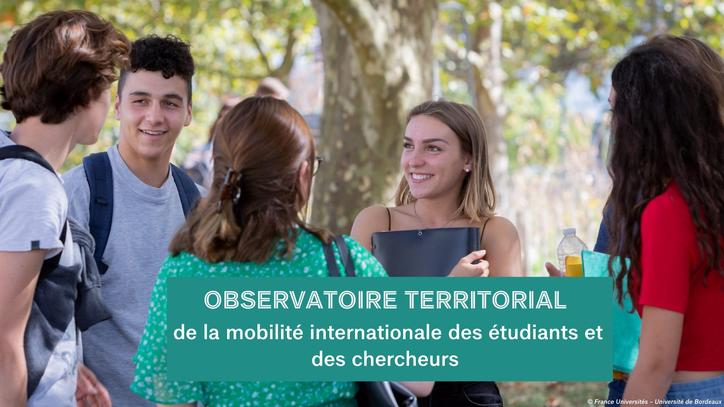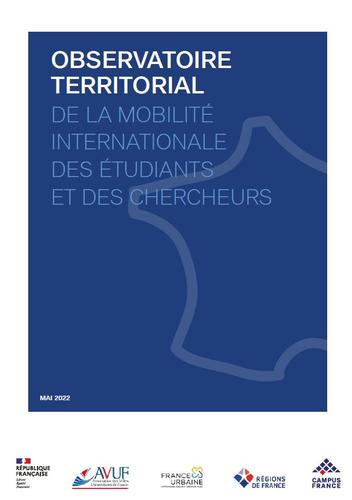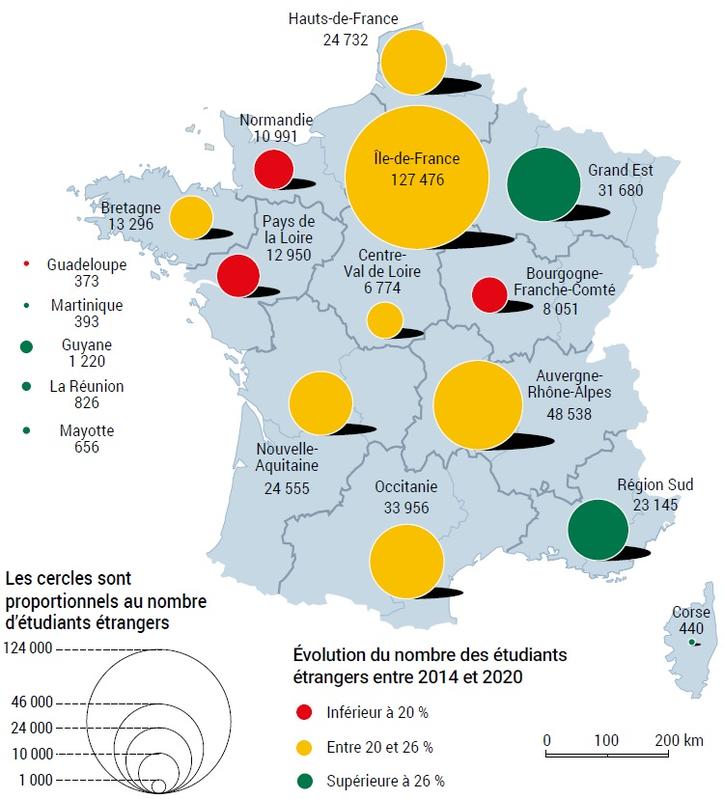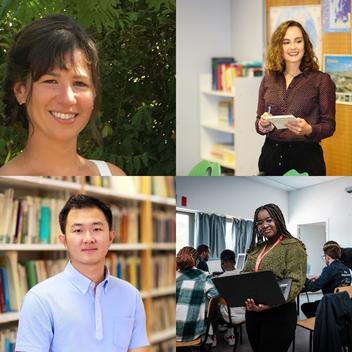
How is the attractiveness of regions and cities changing for students from around the world?
Campus France published the “Observatoire territorial de la mobilité internationale des étudiants et des chercheurs” (Territorial Observatory of the International Mobility of Students and Researchers), a report presenting key figures on the international mobility in French regions and cities, as well as territorial internationalisation strategies. This study was commissioned by the Délégation à l’Action extérieure des collectivités locales (Delegation for the External Action of Local Authorities, DAECT/Ministry of Europe and Foreign Affairs), and carried out by Campus France in collaboration with Régions de France, France Urbaine and the Association des villes universitaires de France (Association of French University Towns, AVUF).
Campus France et ses partenaires dévoilent le 19 mai 2022 les résultats de la nouvelle édition de l’Observatoire territorial de la mobilité internationale des étudiants et chercheurs. Ce rapport présente les chiffres clés de la mobilité internationale des régions et métropoles françaises tout en illustrant les stratégies territoriales d’internationalisation. De nombreux exemples concrets rendent compte de la complémentarité de l’action des différents niveaux territoriaux ainsi que établissements qui y sont présents.
Nouveauté de cette édition, Campus France publie avec le rapport principal une série de 14 Focus Régions et 17 Focus Métropoles qui présentent les résultats détaillés de chaque territoire.

Commanditée par la Délégation à l’Action extérieure des collectivités locales (DAECT/Ministère de l’Europe et des Affaires étrangères), cette étude a été réalisée par Campus France en collaboration avec Régions de France, France Urbaine et l’Association des villes universitaires de France (AVUF).
L’attractivité progresse dans toutes les régions, à des rythmes différents
"La France est l’un des pays les plus attractifs au monde pour les étudiants internationaux, rappelle Donatienne Hissard, Directrice générale de Campus France. Elle compte 370 000 étudiants en mobilité, et ce succès repose beaucoup sur l’engagement des régions et des métropoles". En moyenne nationale, ce chiffre a progressé de 23% depuis 2014. Sur cette période, la mobilité étudiante internationale a progressé dans toutes les régions, la région Sud et Grand Est connaissant les plus fortes croissances (respectivement, 35% et 28%). Au niveau des académies, les plus fortes progressions ont eu lieu à Reims (+46%) et à Nice (+39%). A l’inverse, la Normandie, la Bourgogne-Franche-Comté progressent, mais plus modérément (+14%).

Plus d’un étudiant étranger sur deux (57%) est inscrit dans trois régions : l’Île-de-France, l’Auvergne-Rhône-Alpes et l’Occitanie, et la part d’étudiants étrangers varie de 18% (Île-de-France) à 6% (Corse ; Départements et régions d’Outre-Mer), pour une moyenne de 17%.
Quant à la mobilité sortante, les quatre régions qui envoient les plus d’étudiants sont l’Île-de-France, l’Auvergne-Rhône-Alpes, les Hauts de France et la Nouvelle Aquitaine. Rappelons qu’à l’échelle mondiale, la France est le 6e pays d’origine des étudiants en mobilité diplômante.
Pour Carole Delga, Présidente de la région Occitanie et Présidente de Régions de France, "les mobilités des étudiants et chercheurs bénéficient à l’ensemble des écosystèmes locaux, et permettent de tisser des liens forts entre villes et régions de différents pays d’Europe et du monde. Ambassadeurs de leurs territoires respectifs, étudiants et chercheurs participent ainsi au décloisonnement des savoirs et des approches".
L’action plus récente des métropoles en faveur de l’internationalisation
De création plus récentes, les métropoles se sont saisies plus particulièrement de la promotion de la mobilité entrante, mobilisant ressources humaines et budgétaires à cette fin.
A Paris-Saclay, Strasbourg, Grenoble ou Nice, les métropoles affichent des taux d’étudiants supérieurs à la moyenne de 17%. Le nombre d’étudiants étrangers a connu des progressions très rapides pour Paris Saclay (+90%), Cergy Pontoise (+53%), Grand Nancy (+38%) ou encore Bordeaux Métropole (+36%).
Les métropoles apportent également un soutien précieux aux associations et institutions locales favorisant la mobilité des étudiants et des chercheurs, et promeuvent des mobilités encadrées à travers le jumelage avec d’autres villes.
Pour Johanna Rolland, Maire de Nantes, Présidente de Nantes Métropole, et Présidente de France urbaine, "Les métropoles et villes universitaires sont fortement engagées, en soutenant notamment financièrement les établissements d’enseignement supérieur. Elles vont encore renforcer, dans les années à venir, leurs coopérations. La clé du succès passe par ces alliances pragmatiques et intelligentes entre territoires et Etat. Elles participent très largement à l’attractivité du pays et aux dynamiques locales sur le long terme".
Pour Catherine Vautrin, Présidente de la Communauté urbaine de Reims et de l’AVUF, "les étudiants en mobilités internationales peuvent être des ambassadeurs de nos territoires, et nos collectivités doivent pendre toute leur part pour faire de leur séjour d’étude ou de recherche une expérience de vie heureuse et fructueuse".
Related contents
-
CollectionObservatoireMise à jourMay 2022
- Delegation for the External Action of Local Authoritieshttps://www.diplomatie.gouv.fr/fr/politique-etrangere-de-la-france/action-exterieure-des-collectivites-territoriales/
- Regions of Francehttps://regions-france.org/
- France urbainehttps://franceurbaine.org/
- Association of University Cities in Francehttps://www.avuf.fr/
Recommended News























































